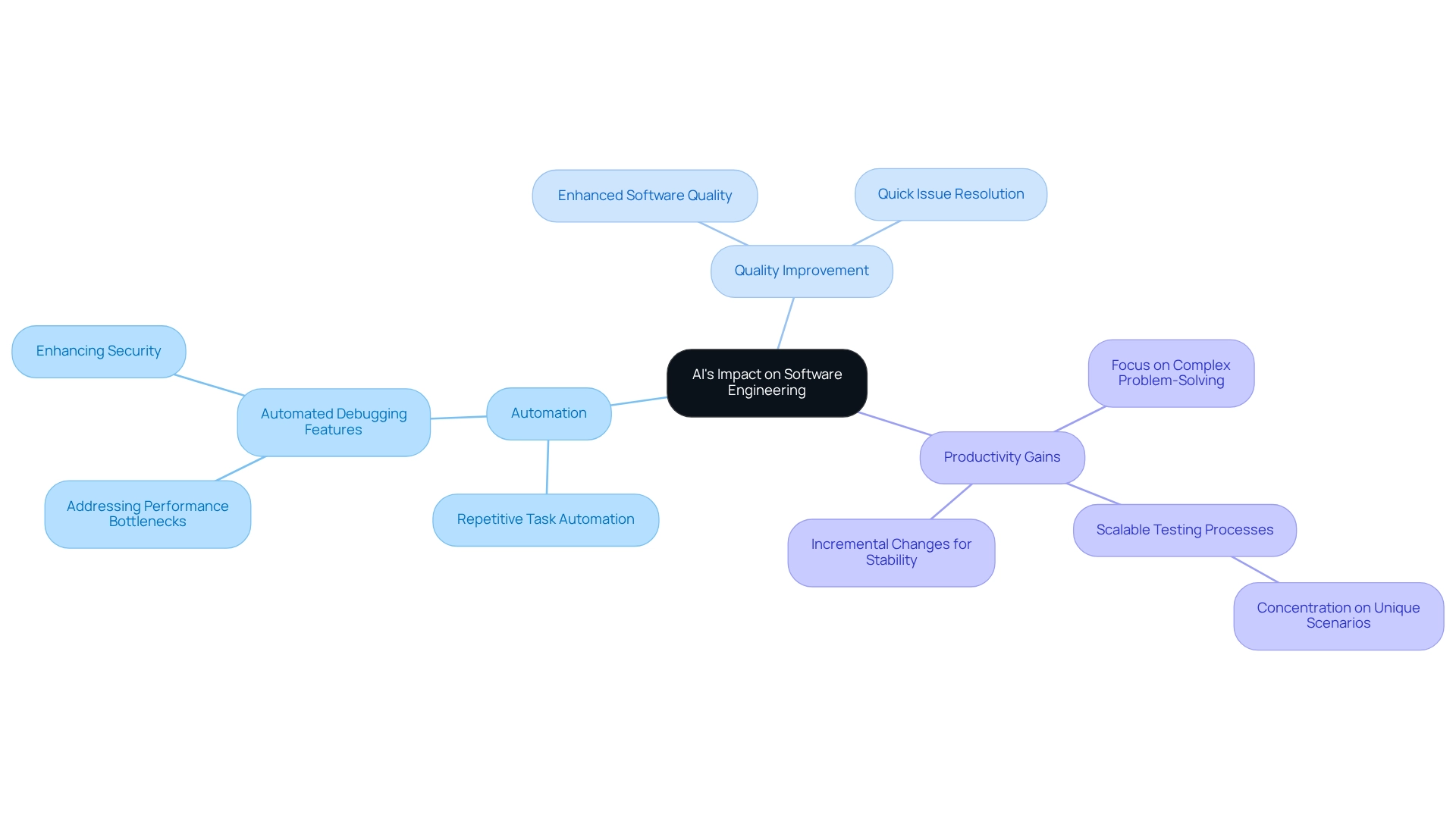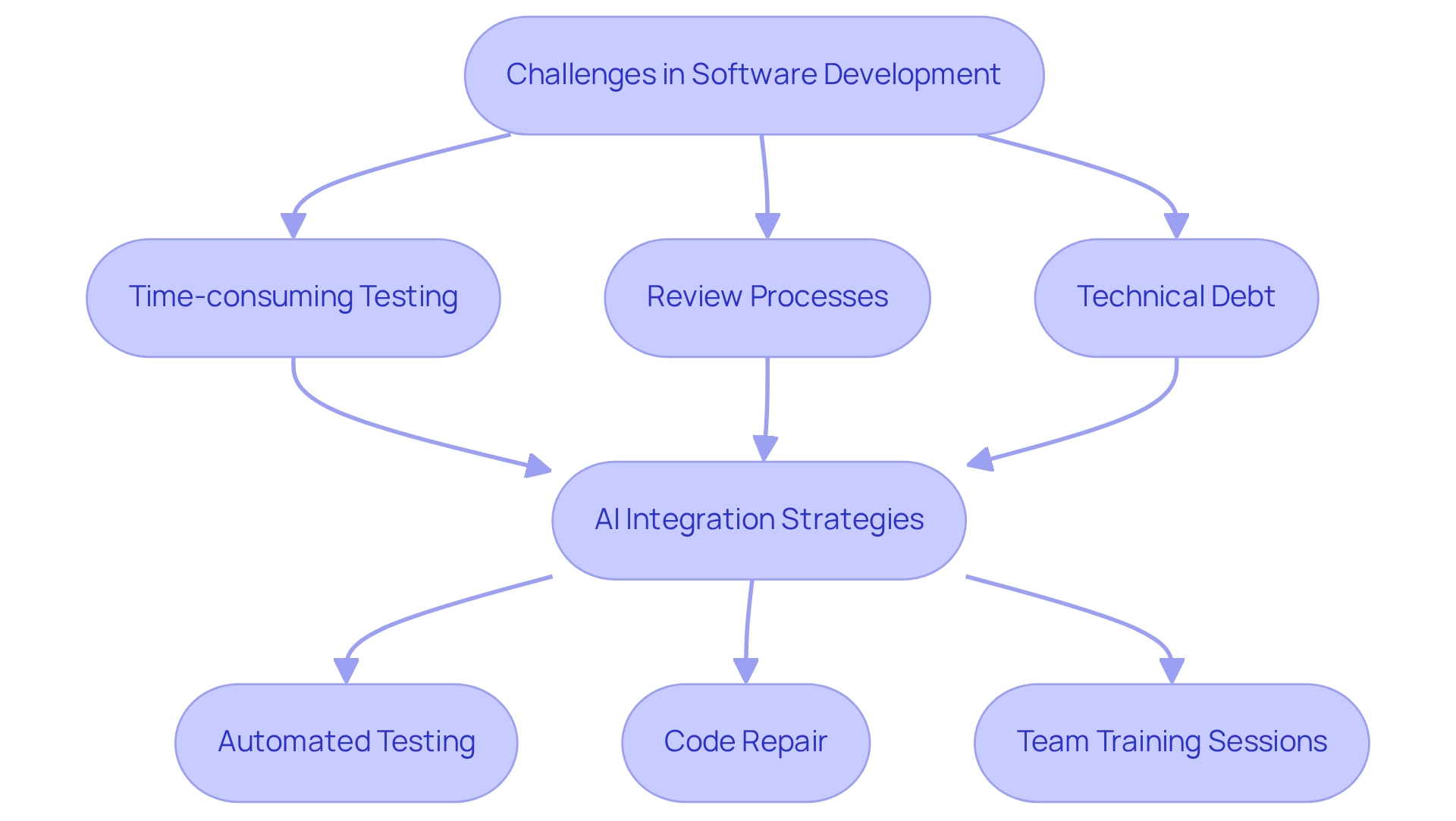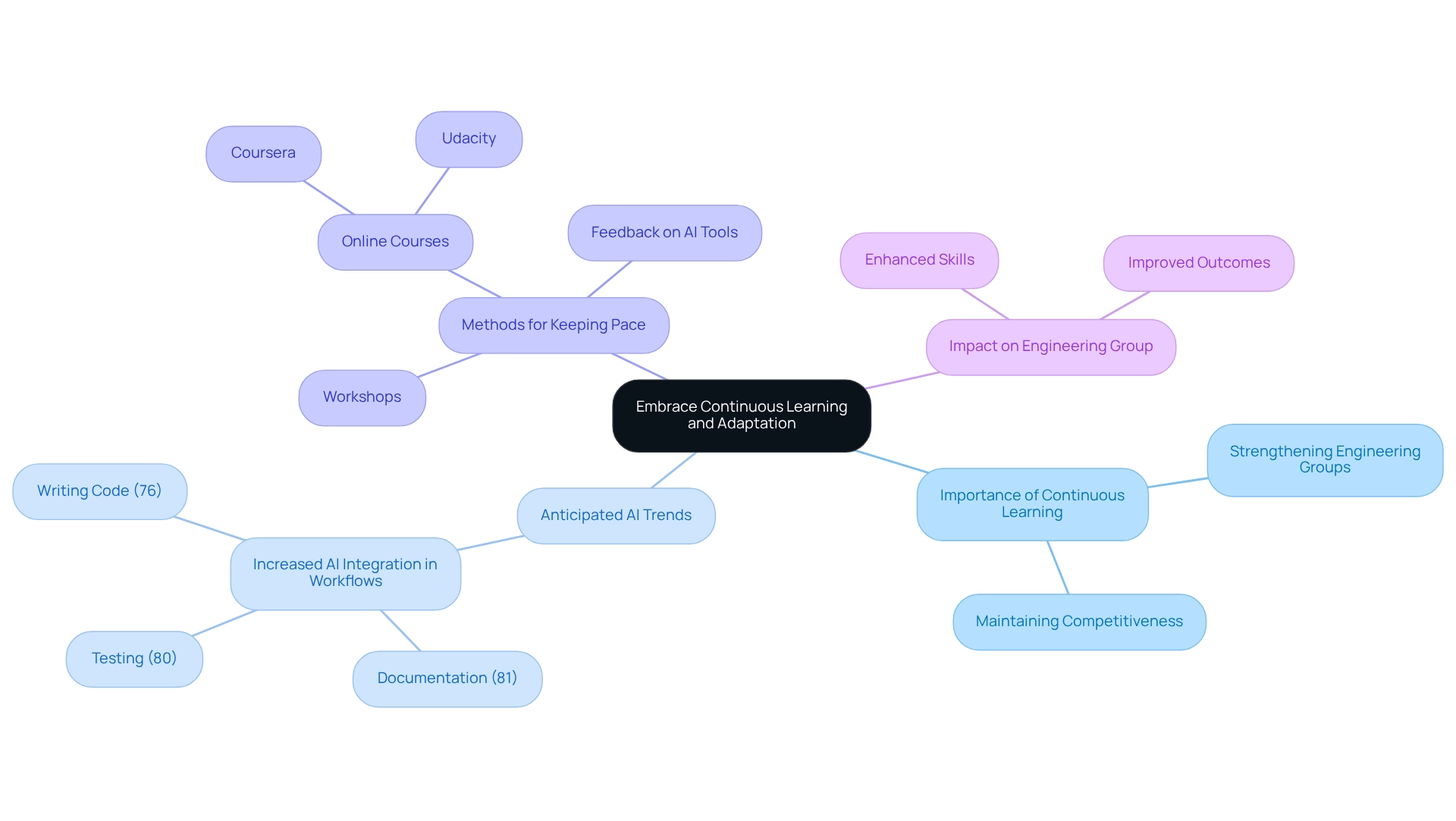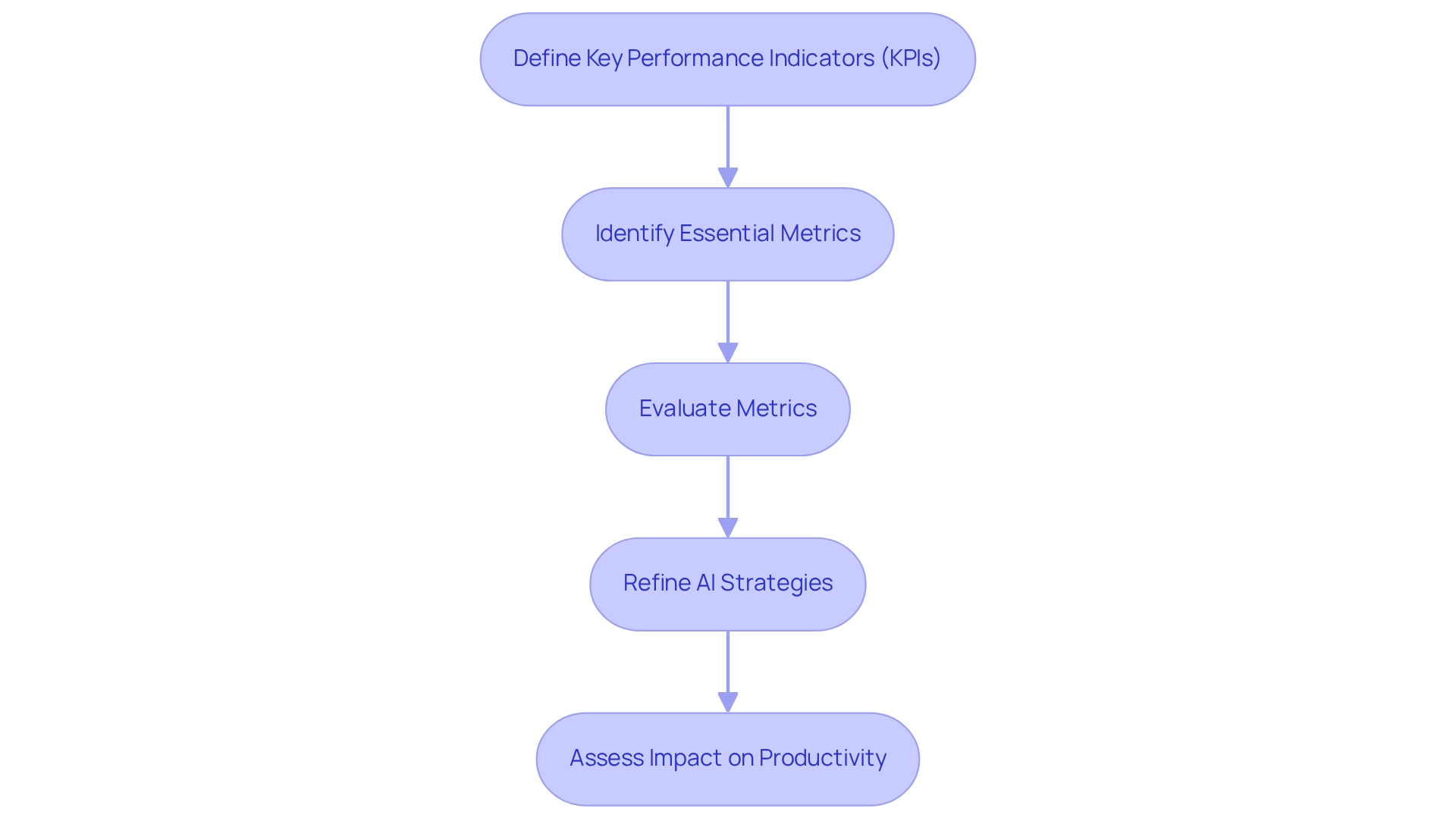Overview
The article highlights the challenges faced by software engineers in today's fast-paced coding environment. With the increasing complexity of projects, how can developers streamline their workflow? Kodezi emerges as a powerful ally, offering automation that tackles routine tasks, allowing engineers to dedicate more time to intricate problem-solving. Additionally, Kodezi fosters a culture of continuous learning, equipping developers with the skills necessary to adapt to ever-evolving technologies.
By leveraging Kodezi, engineers can significantly enhance their productivity and code quality. Imagine automating repetitive coding tasks, which not only saves time but also reduces the likelihood of errors. Furthermore, the platform's focus on performance measurement provides valuable insights into coding practices, enabling developers to refine their techniques and deliver higher-quality work.
In addition to these features, Kodezi encourages ongoing skill development, ensuring that engineers remain at the forefront of industry advancements. Are you ready to elevate your coding practices? Explore the tools available on Kodezi's platform and experience the benefits of improved efficiency and effectiveness in your software engineering journey.
Introduction
In the fast-paced world of software engineering, developers often face significant challenges. How can they effectively manage the increasing complexity of coding tasks? Enter Kodezi CLI, a tool designed to tackle these very issues. By automating mundane tasks and enhancing code quality, Kodezi empowers developers to focus on more complex problems instead of routine coding.
Furthermore, Kodezi's ability to autonomously identify and rectify code issues streamlines the development process, leading to improved productivity and efficiency. As organizations recognize the transformative potential of AI in software development, understanding how to integrate these technologies becomes crucial.
In addition, leveraging Kodezi not only aids in optimizing development cycles but also fosters a culture of continuous learning among engineers. By measuring outcomes effectively, teams can maximize productivity in an increasingly competitive environment.
Are you ready to explore how Kodezi can revolutionize your coding practices? Discover the tools available on the platform and elevate your software development experience.
Understand AI's Impact on Software Engineering
Coding challenges are a common hurdle for developers, often leading to inefficiencies and frustration. The integration of AI for software engineers is fundamentally reshaping the field by automating repetitive tasks, enhancing software quality, and speeding up project cycles. Tools like Kodezi CLI exemplify this transformation by autonomously identifying and fixing codebase issues. This allows developers to focus on complex problem-solving rather than routine coding tasks.
How does Kodezi address these challenges? Recent studies suggest that using AI for software engineers can greatly improve productivity. For example, Kodezi's automated debugging features ensure that performance bottlenecks and security concerns are addressed quickly, enhancing overall software quality. Furthermore, AI's ability to scale testing processes empowers human testers to concentrate on unique scenarios, thereby improving delivery stability and reducing the likelihood of production issues.
The benefits of using Kodezi are significant. As Jonathan Lessard, President & Co-Founder, notes, the DORA report highlights that smaller, incremental changes improve delivery stability. As organizations increasingly adopt AI for software engineers, a structured approach—including training, use case selection, and risk controls—becomes essential to maximize productivity gains. Understanding these dynamics is crucial for engineers aiming to leverage AI for software engineers effectively and maintain a competitive edge in the rapidly evolving software landscape.
Are you ready to enhance your coding practices? The case study 'Generative AI's Role in Software Development Transformation' illustrates the transformative potential of generative AI in improving speed and quality within software development processes. Explore the tools available on the Kodezi platform to experience these benefits firsthand.

Adopt Effective AI Integration Strategies
In today's fast-paced software development landscape, developers often encounter significant challenges, such as time-consuming testing and review processes, which can be mitigated through the use of AI for software engineers. How can these hurdles be overcome? Kodezi offers innovative solutions that streamline these tasks, enabling teams to focus on what truly matters.
By automating testing and review processes, Kodezi not only enhances efficiency but also ensures that teams can maintain high standards of code quality. Features like Kodezi CLI proactively detect potential issues and automatically repair codebases, allowing developers to redirect their efforts toward more strategic initiatives.
Imagine a collaborative environment where AI applications and human programmers work hand in hand. Frequent training sessions on tools like KodeziChat empower team members to resolve coding questions swiftly, equipping them with the skills necessary for effective technology utilization. This synergy ultimately leads to improved productivity and reduced technical debt.
As organizations increasingly adopt AI—projected to encompass two-thirds of enterprises by 2025—embracing these strategies becomes essential. By leveraging Kodezi's capabilities, teams can maximize the benefits of AI for software engineers through AI-driven automation, positioning themselves for success in their workflows. Ready to transform your coding practices? Explore the tools available on Kodezi's platform today.

Embrace Continuous Learning and Adaptation
As AI technologies advance, software engineers must embrace AI for software engineers to stay relevant in a rapidly evolving field. Continuous learning is essential, as 76% of developers anticipate increased incorporation of AI for software engineers in their workflows within the upcoming year.
How can engineers keep pace with these changes? Engaging in workshops and online courses, such as those offered by Coursera and Udacity, significantly enhances skills in AI for software engineers. Furthermore, actively seeking feedback on the use of AI tools allows engineers to refine their methods and improve outcomes.
By nurturing a culture of lifelong learning, individual skills not only enhance but also strengthen the overall effectiveness of the engineering group, ensuring competitiveness in a dynamic marketplace.

Measure and Optimize AI Implementation Outcomes
In the face of persistent coding challenges, engineering teams must seek effective solutions, including AI for software engineers, to enhance their development processes. How can they measure success in their AI implementations? By defining key performance indicators (KPIs) that align with their specific objectives. Essential metrics such as software quality, bug detection rates, and progress speed offer invaluable insights into the performance of AI tools like Kodezi CLI. This independent solution for B2B engineering groups not only elevates code quality but also addresses issues before they reach production, significantly boosting overall development efficiency.
Consistent evaluation of these metrics enables teams to pinpoint areas needing improvement and refine their AI strategies accordingly. For instance, if an AI tool fails to substantially reduce bug rates, it may require a reassessment of its integration or additional training for staff. By committing to ongoing assessment and enhancement of AI outcomes, teams can fully leverage the advantages that AI for software engineers offers, ensuring continuous progress in their software development processes.
Furthermore, organizations that adopt a comprehensive evaluation framework can substantiate their AI investments and make informed strategic decisions. This ultimately leads to increased productivity and enhanced customer satisfaction, as illustrated by case studies like Drip Capital's productivity tracking initiative. In addition, incorporating diverse stakeholder feedback can yield a well-rounded understanding of AI's benefits and challenges. Leveraging analytics from DevSecOps platforms provides visibility into AI for software engineers, which aids teams in assessing the tangible impact of AI on software development. Are you ready to explore the tools available on the Kodezi platform to transform your coding practices?

Conclusion
In the ever-evolving landscape of software engineering, the integration of AI is not merely a trend but a necessity. Developers face numerous coding challenges that can hinder productivity and innovation. Tools like Kodezi CLI are at the forefront of this transformation, automating mundane tasks, enhancing code quality, and allowing developers to dedicate their efforts to more complex challenges. By embracing AI, teams can streamline their workflows, improve productivity, and foster a culture of continuous learning—essential for staying competitive in today's fast-paced environment.
To harness the full potential of AI, organizations must adopt effective integration strategies, identify specific use cases, and establish clear objectives. Regular training on AI tools empowers developers to maximize the benefits these technologies offer, ensuring that both individual skills and team performance are continuously enhanced. This proactive approach not only mitigates technical debt but also drives innovation within software development processes.
Ultimately, the commitment to measuring and optimizing AI implementation outcomes is crucial for long-term success. By defining relevant KPIs and regularly assessing the impact of AI tools, engineering teams can refine their strategies, ensuring that they derive maximum value from their investments. As the industry progresses, those who prioritize AI integration, continuous learning, and data-driven decision-making will position themselves at the forefront of software development, leading to improved efficiency and customer satisfaction. Embracing these changes is the key to thriving in the competitive software engineering landscape.
Frequently Asked Questions
What challenges do developers face with coding?
Developers often encounter coding challenges that lead to inefficiencies and frustration, particularly with repetitive tasks.
How is AI transforming the field for software engineers?
AI is reshaping the field by automating repetitive tasks, enhancing software quality, and speeding up project cycles.
What is Kodezi CLI and how does it help developers?
Kodezi CLI is a tool that autonomously identifies and fixes codebase issues, allowing developers to focus on complex problem-solving instead of routine coding tasks.
How does Kodezi improve productivity for software engineers?
Kodezi's automated debugging features quickly address performance bottlenecks and security concerns, enhancing overall software quality and allowing human testers to focus on unique scenarios.
What does the DORA report suggest about software delivery?
The DORA report indicates that smaller, incremental changes improve delivery stability, which is crucial as organizations adopt AI for software engineering.
What is essential for maximizing productivity gains with AI in software engineering?
A structured approach that includes training, use case selection, and risk controls is essential for maximizing productivity gains with AI.
What case study illustrates the potential of generative AI in software development?
The case study titled "Generative AI's Role in Software Development Transformation" demonstrates the transformative potential of generative AI in improving speed and quality within software development processes.
Where can I explore tools to enhance my coding practices?
You can explore the tools available on the Kodezi platform to experience the benefits of AI in software engineering firsthand.




